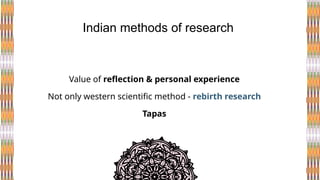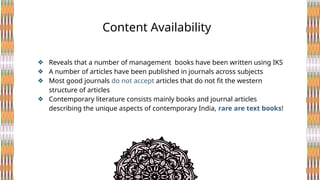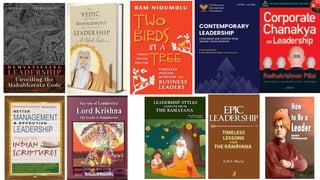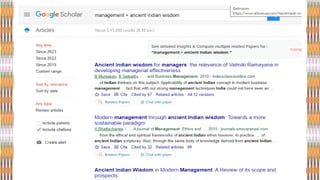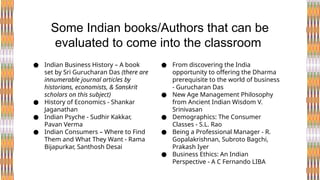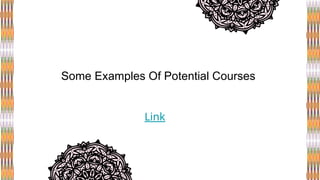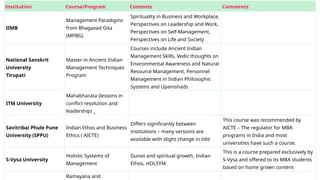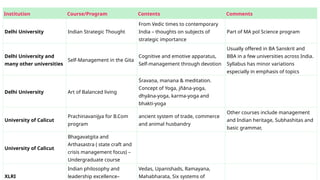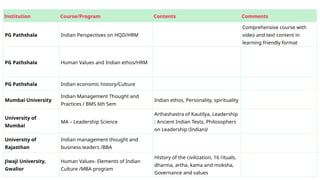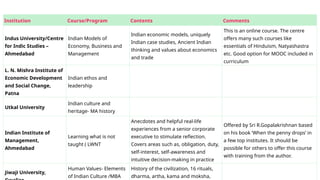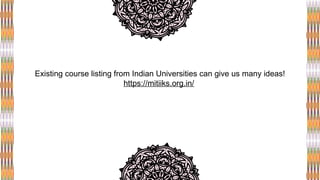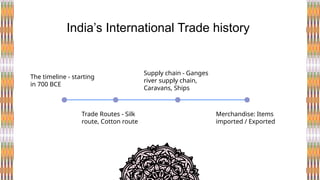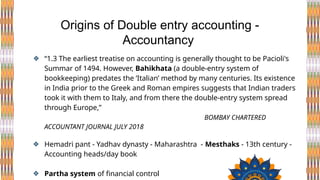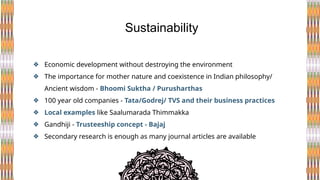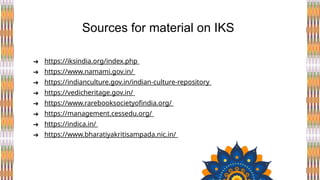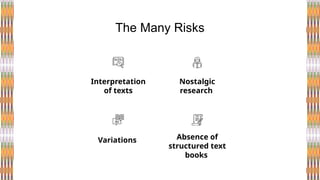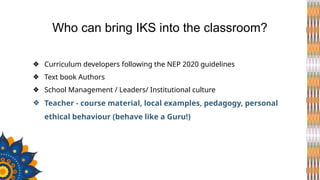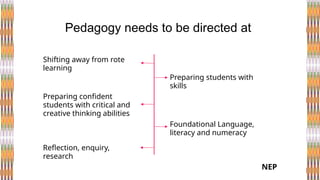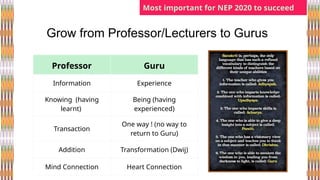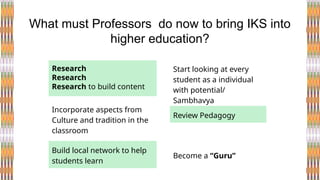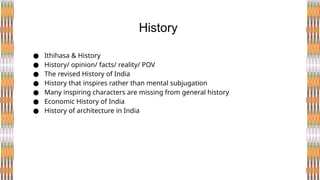Bringing IKS into Management and Commerce curriculum
- 1. Dr. G P Sudhakar, Centre for Educational and Social Studies, Bengaluru Bringing Indian Knowledge Systems Into Management & Commerce Curriculum . Refresher program in Commerce and Management, Jalgoan,
- 2. â Kaundinya â Kanji Malam â Mandvi port â Fateh Chand - Jagath Seth title 1723 â Gathapathi Saddalputra -500 to 300 BC â Sreni
- 3. Lothal -Construction of the city is believed to have begun around 2200 BCE International trade in gems, beads and ornaments
- 4. Routes in early Hindu Period. --The early rock-cut remains at Ajanta. at Patna near Chalisgaon. at Chandor, and at Nasik, make it probable that, as far back as the second and first centuries before Christ, trade routes between north and south India passed close to those places. In the third century A. D., the author of the Periplus (247 A. D.) mentions that trade crossed Khandesh from Broach to Paithan on the Godavari and to Tagara ten days further east [Mc Crindle's Periplus, 125-26.]. If the statement that it lay ten days to the east of Paithan is correct, the trade probably passed eastwards through Khandesh, leaving the district either near Patan or near Ajanta. The road, though very difficult, was passable for wagons [Gazetteer of the Bombay Presidency, Vol. XII, 1880.].
- 5. Sreni first mentioned in the Mahabharata â.. if one uses the most recent dating for the earliest written material(1500 BC to 800 BC) then by 1000 BC to 800 BC the sreni and pani were known to Indians The sreni predates the earliest Roman prototype corporations by centuries and it is considerably more complex and detailed than Roman entitiesâ Khanna Vikramaditya S, The Economic History of corporate form in Ancient India, 1997 - Compares modern US corporation to Sreni and finds them very similar Another interesting book is Majumdar, Ramesh Chandra, (1920), Corporate Life in Ancient India,
- 7. šÝšÝßĢ taken from online source. Credit to :S. Kalyanaraman,Sarasvati Research Centre,kalyan97@gmail.com
- 8. âThe fundamental principles that will guide both the education system at large, as well as the individual institutions within it are: âĶa rootedness and pride in India, and its rich, diverse, ancient and modern culture and knowledge systems and traditions;â NEP 2020 IKS in the National Education Policy
- 9. âInstilling knowledge of India and its varied social, cultural, and technological needs, its inimitable artistic, language, and knowledge traditions, and its strong ethics in Indiaâs young people is considered critical for purposes of national pride, self-confidence, self-knowledge, cooperation, and integrationâ [NEP 2020, Introduction, p. 4]
- 10. Ananda Coomaraswamy: Education in India Source: Modern Review, October 1908 Speak to the ordinary graduateâĶ on the ideals of the Mahabharataâhe will hasten to display his knowledge of Shakespeare; talk to him of religious philosophyâyou find that he is an atheist of the crude type common in Europe a generation agoâĶnot only has he no religion but he is as lacking in philosophy as the average EnglishmanâĶtalk to him of Indian artâit is news to him that such a thing exists; ask him to translateâĶa letter written in his own mother tongueâhe does not know it. He is indeed a stranger in his own land.
- 11. o4.29 All curriculum and pedagogy, from the foundational stage onwards, will be redesigned to be strongly rooted in the Indian and local context and ethos in terms of culture, traditions, heritage, customs, language, philosophy, geography, ancient and contemporary knowledge, societal and scientific needs, indigenous and traditional ways of learning etc. â in order to ensure that education is maximally relatable, relevant, interesting, and effective for our students. Stories, arts, games, sports, examples, problems, etc. will be chosen as much as possible to be rooted in the Indian and local geographic context. Ideas, abstractions, and creativity will indeed best flourish when learning is thus rootedâ IKS in the National Education Policy
- 12. âevery student enrolled in a UG or PG programme should be encouraged to take credit courses in IKS amounting in all to at least five per cent of the total mandated credits. It is envisioned that the interested students studying in UG and PG courses may be allowed to take a larger fraction of the total mandated credits in the fields of IKS. 2. At least 50% of the credits apportioned to the IKS should be related to the major discipline and should be accounted for the credits assigned to the major discipline. 3. Special care should be taken to ensure that the course materials for these IKS courses are based on authentic sourcesâ IKS in the National Education Policy
- 13. 1. Total credits of the courses taken in IKS amount to at least five per cent of the total mandated credits. The students may be encouraged to take these courses, preferably during the first four semesters of the UG programme. At least half of these mandated credits should be in courses in disciplines which are part of IKS and are related to the major field of specialization that the student is pursuing in the UG programme 2. All the students should take a Foundational Course in Indian Knowledge System, which is designed to present an overall introduction to all the streams of IKS relevant to the UG programme. 18 foundation courses suggested. 3. All UG-teaching Institutions should offer a large number of Elective Courses in IKS, from which the students may choose appropriately so as to complete a requisite number of courses and credits in IKS. These credits may be apportioned to the core disciplinary courses and the multidisciplinary courses. For Undergraduate programs
- 14. 1. Total credits of the courses taken in IKS = At least 5% of the total mandated credits. *Preferably during the first four semesters of the UG programme. *At least half of these mandated credits in disciplines part of IKS + related to the major field of the studentâs UG specialization. 2. Foundational Course in IKS - To present an overall introduction to all the streams of IKS relevant to the UG programme. *18 foundation courses suggested. 3. Offer large number of Elective Courses in IKS for the students to choose from, so as to complete a requisite number of courses and credits in IKS. *These credits may be apportioned to the core disciplinary courses and the multidisciplinary courses. For Undergraduate programs
- 15. 1. All the students studying for PG programmes in Arts, Commerce and Sciences should take an adequate number of advanced credit courses in any of the disciplines/topics that are part of IKS and related to their subject of specialization so that the total credits of the courses taken by the student in IKS amount to at least five percent of the total mandated credits. 2. The students may be allowed to opt for taking additional courses in disciplines/ topics that are part of IKS if such an option is available and is consistent with the requirements of the PG programme. For post graduate programs
- 16. â IKS - Bharatiya Jnanaparampara Sanatana Ganga Pravha â Gyan - includes spiritual, experiential and wisdom â Parampara - Continuity â Sanatana - Eternal â My qualifications : Pristine product of Macaulayâs education system - no orientation or brush with any component of IKS â NEP 2020 - A political tool - Judge it by reading the 60 pages Thatâs what UGC and NEP 2020 specifically say... Rest of this talk, is my opinion, interpretation and choice of facts IKS - Not because it is mandatory, Adopt the âspiritâ rather than the rules and guidelines
- 17. â âBhartrhari says, "Mind acquires critical acumen by interacting with the other traditions. What does he know who knows only his own tradition?" A beautiful thought but sadly today, with our systems of knowledge having been marginalized and excluded from the mainstream education, we have to ask - "What does he know who does not Know his own tradition?" â Prof Kapil Kapoor - concluding paragraph - Indian Knowledge Systems Nature, Philosophy and Character
- 18. Correcting a historical mistake Develops Pride & self- confidence in the learners African countries & China have done substantial research on Indigenous knowledge integration into the curriculum - Findings: Substantial value add to understanding, retention & real connect with the content The content available is substantial, unique, & very useful in today's world Different perspective than the western paradigm Why IKS?
- 19. Some background â Many thousands of years of economic/ Intellectual/ scientific/ cultural activity/ experience - Knowledge creation â Today - Unorganized sector is 3-4 times the size of organized sector in value and maybe 10 times in employment. India Uninc. â We have a huge reservoir of knowledge, case studies, best practices. Angus Maddisonâs (2003) work shows that By 1st millennia CE, Indiaâs GDP acquired about one-third to half of total world GDP. The Golden Age of India had reached its peak during the Gupta dynasty circa 6th century.
- 20. English/Present system Bharatiya system & A new Swadeshi Movement in Education with NEP2020 Obedience Freedom to learn Focus on Employment Focus on Man Making education Creating a Selfish world Creating a harmonious world Sustainability is not all pervading Sustainability is critical and woven into all aspects Industrial age Inner growth age Unable to answer questions about traditions and local aspects Integrated with traditions and local community Information focused Lifelong learning
- 21. Educational content - Syllabus, Examples, Pedagogy Culture of the Institution - Daily routine, events, dress code, behaviour patterns Holistic development - emphasis on physical health/ Mental health/ Social health/Learning Guru griha vasa - Experiential/ Role model/ Mentorship /Personalised Extra curricular activities Connect with local industry/ institutions/ history/ way of life How to bring IKS into curriculum?
- 22. A step by step approach to bring IKS into the syllabus Bring more and more Indian examples, case studies into existing courses and add field work, interaction with local community or local resources specific to the Include a few units based on IKS into current courses (This is the best way to integrate western and Indic POV, however toughest to do) Introduce IKS based courses as core and many as electives in existing programs Launch IKS based programs 01 02 03 04 Should you have a department of IKS ??? Dina Chariya, Pedagogy, Setting an Example, Connect with local community easier and faster to achieve than changes in syllabus
- 23. What are the potential components of Bharatiya Management in higher education content Concepts/ practices/ case studies which are uniquely Indian and contemporary. Concepts/ ideas/ constructs based on Indiaâs ancient wisdom. Also, history Research methods unique to India 01 02 03
- 24. More recent material from Vivekananda, Gandhi, Shankara Water/Kingdoms/Temples/ International trade Are ancient ideas relevant for today's managers? Management concepts/ ideas/ constructs based on Indiaâs ancient wisdom Bharatiya sources used in a few Management Schools appear to be Vedas, Upanishads, Ramayana, Mahabharata, Arthasashtra by Chanakya/ Kauthilya, Panchatantra, Tirukural etc. Did ancient Indians have experience in Management?
- 27. What can we learn about motivation from Ramayana? Another example
- 28. 2. Contemporary Management concepts/ practices/ case studies which are uniquely Indian Case studies like â Aravind Eye, Kumbh Mela Business Practices of Marwari, Chettierâs, Parsiâs Grand research opportunity - local and Hyper local content can be generated Concepts such as Jugaad-frugal innovation The unorganized sector is 82% of the workforce and contributes 50% of GDP Bottom of the pyramid opportunity â CKP â pioneers MNC - HLL/Nirma/Wheel Key šÝšÝßĢ
- 29. Indian Models of Economy, Business and Management by Prof P Kanagasabapathi Indian Business Models Western Business Models Family Orientation Individualistic Dominance of Non Corporate Sector Dominance of Corporate Sector Generation of funds from own/close sources Contract based Transactions Community Drive Risk Diverting NAture Relationship, Faith and Goodwill as base Large Scale absence of Ethical orientation Less dependence on state Risk bearing nature
- 30. The India way: Lessons for the U.S. Abstract We describe a distinctive approach to business associated with the major corporations in India and contrast it with practices in the United States. Specifically, the Indian approach eschews the explicit pursuit of shareholder value in favor of goals associated with a social mission. These companies make extraordinary investments in their employees and empower them in decision making.
- 31. Academy of Management These practices combine with a distinctively Indian approach to problem solving to create a competitive advantage that has led to spectacular business growth, not just within India but in international markets as well. A particularly important lesson for the United States is that the major Indian companies are not succeeding despite the fact that they are pursuing a social mission and investing in their employees. They are succeeding precisely because they do so. Cappelli, Peter & Singh, Harbir & Singh, Jitendra & Useem, Michael. (2010). The India way: Lessons for the U.S.. Academy of Management Perspectives.
- 32. Economics
- 33. â Differences in concept of time (linear/ cyclical) â Start with Goal/ Self â Western research is aimed at proving with scientific data analysis â nyAya includes information perceived by sense organs, and is empirical. Indian methodology uses both empirical evidence and experience (for direct experience of truth or self or brahman). â Indian research is aimed at proving and ârealizingâ the truth by oneself for oneself Direct experience alone is the basis for all proofs.... [2.19-20] Yoga- VÂŊasis.t.ha 3. Research methodology that is uniquely Indian
- 34. Value of reflection & personal experience Not only western scientific method - rebirth research Tapas Indian methods of research
- 35. â Reveals that a number of management books have been written using IKS â A number of articles have been published in journals across subjects â Most good journals do not accept articles that do not fit the western structure of articles â Contemporary literature consists mainly books and journal articles describing the unique aspects of contemporary India, rare are text books! Content Availability
- 38. â Indian Business History â A book set by Sri Gurucharan Das (there are innumerable journal articles by historians, economists, & Sanskrit scholars on this subject) â History of Economics - Shankar Jaganathan â Indian Psyche - Sudhir Kakkar, Pavan Verma â Indian Consumers â Where to Find Them and What They Want - Rama Bijapurkar, Santhosh Desai Some Indian books/Authors that can be evaluated to come into the classroom â From discovering the India opportunity to offering the Dharma prerequisite to the world of business - Gurucharan Das â New Age Management Philosophy from Ancient Indian Wisdom V. Srinivasan â Demographics: The Consumer Classes - S.L. Rao â Being a Professional Manager - R. Gopalakrishnan, Subroto Bagchi, Prakash Iyer â Business Ethics: An Indian Perspective - A C Fernando LIBA
- 39. Some Examples Of Potential Courses Link
- 40. Institution Course/Program Contents Comments IIMB Management Paradigms from Bhagavad Gita (MPBG) Spirituality in Business and Workplace, Perspectives on Leadership and Work, Perspectives on SelfâManagement, Perspectives on Life and Society National Sanskrit University Tirupati Master in Ancient Indian Management Techniques Program Courses include Ancient Indian Management Skills, Vedic thoughts on Environmental Awareness and Natural Resource Management, Personnel Management in Indian Philosophic Systems and Upanishads ITM University Mahabharata (lessons in conflict resolution and leadership) _ Savitribai Phule Pune University (SPPU) Indian Ethos and Business Ethics ( AICTE) Differs significantly between institutions â many versions are available with slight change in title This course was recommended by AICTE â The regulator for MBA programs in India and most universities have such a course. S-Vysa University Holistic Systems of Management Gunas and spiritual growth, Indian Ethos, HOLSYM This is a course prepared exclusively by S-Vysa and offered to its MBA students based on home grown content Ramayana and
- 41. Institution Course/Program Contents Comments Delhi University Indian Strategic Thought From Vedic times to contemporary India â thoughts on subjects of strategic importance Part of MA pol Science program Delhi University and many other universities Self-Management in the Gita Cognitive and emotive apparatus, Self-management through devotion Usually offered in BA Sanskrit and BBA in a few universities across India. Syllabus has minor variations especially in emphasis of topics Delhi University Art of Balanced living Åravaáđa, manana & meditation. Concept of Yoga, jÃąÄna-yoga, dhyÄna-yoga, karma-yoga and bhakti-yoga University of Calicut Prachinavanijya for B.Com program ancient system of trade, commerce and animal husbandry Other courses include management and Indian heritage, Subhashitas and basic grammar, University of Calicut Bhagavatgita and Arthasastra ( state craft and crisis management focus) â Undergraduate course XLRI Indian philosophy and leadership excellenceâ Vedas, Upanishads, Ramayana, Mahabharata, Six systems of
- 42. Institution Course/Program Contents Comments PG Pathshala Indian Perspectives on HQD/HRM Comprehensive course with video and text content in learning friendly format PG Pathshala Human Values and Indian ethos/HRM PG Pathshala Indian economic history/Culture Mumbai University Indian Management Thought and Practices / BMS 6th Sem Indian ethos, Personality, spirituality University of Mumbai MA â Leadership Science Arthashastra of Kautilya, Leadership : Ancient Indian Texts, Philosophers on Leadership (Indian)/ University of Rajasthan Indian management thought and business leaders /BBA Jiwaji University, Gwalior Human Values- Elements of Indian Culture /MBA program History of the civilization, 16 rituals, dharma, artha, kama and moksha, Governance and values
- 43. Institution Course/Program Contents Comments Indus University/Centre for Indic Studies â Ahmedabad Indian Models of Economy, Business and Management Indian economic models, uniquely Indian case studies, Ancient Indian thinking and values about economics and trade This is an online course. The centre offers many such courses like essentials of Hinduism, Natyashastra etc. Good option for MOOC included in curriculum L. N. Mishra Institute of Economic Development and Social Change, Patna Indian ethos and leadership Utkal University Indian culture and heritage- MA history Indian Institute of Management, Ahmedabad Learning what is not taught ( LWNT Anecdotes and helpful real-life experiences from a senior corporate executive to stimulate reflection. Covers areas such as, obligation, duty, self-interest, self-awareness and intuitive decision-making in practice Offered by Sri R.Gopalakrishnan based on his book âWhen the penny dropsâ in a few top institutes. It should be possible for others to offer this course with training from the author. Jiwaji University, Human Values- Elements of Indian Culture /MBA History of the civilization, 16 rituals, dharma, artha, kama and moksha,
- 44. Existing course listing from Indian Universities can give us many ideas! https://mitiiks.org.in/
- 45. Indiaâs International Trade history The timeline - starting in 700 BCE Trade Routes - Silk route, Cotton route Supply chain - Ganges river supply chain, Caravans, Ships Merchandise: Items imported / Exported
- 46. â â1.3 The earliest treatise on accounting is generally thought to be Pacioli's Summar of 1494. However, Bahikhata (a double-entry system of bookkeeping) predates the âItalianâ method by many centuries. Its existence in India prior to the Greek and Roman empires suggests that Indian traders took it with them to Italy, and from there the double-entry system spread through Europe,â BOMBAY CHARTERED ACCOUNTANT JOURNAL JULY 2018 â Hemadri pant - Yadhav dynasty - Maharashtra - Mesthaks - 13th century - Accounting heads/day book â Partha system of financial control Origins of Double entry accounting - Accountancy
- 47. â Economic development without destroying the environment â The importance for mother nature and coexistence in Indian philosophy/ Ancient wisdom - Bhoomi Suktha / Purusharthas â 100 year old companies - Tata/Godrej/ TVS and their business practices â Local examples like Saalumarada Thimmakka â Gandhiji - Trusteeship concept - Bajaj â Secondary research is enough as many journal articles are available Sustainability
- 48. â https://iksindia.org/index.php â https://www.namami.gov.in/ â https://indianculture.gov.in/indian-culture-repository â https://vedicheritage.gov.in/ â https://www.rarebooksocietyofindia.org/ â https://management.cessedu.org/ â https://indica.in/ â https://www.bharatiyakritisampada.nic.in/ Sources for material on IKS
- 49. The Many Risks Interpretation of texts Nostalgic research Variations Absence of structured text books
- 50. â Curriculum developers following the NEP 2020 guidelines â Text book Authors â School Management / Leaders/ Institutional culture â Teacher - course material, local examples, pedagogy, personal ethical behaviour (behave like a Guru!) Who can bring IKS into the classroom?
- 51. Shifting away from rote learning Pedagogy needs to be directed at Preparing students with skills Preparing confident students with critical and creative thinking abilities Foundational Language, literacy and numeracy Reflection, enquiry, research NEP
- 52. Professor Guru Information Experience Knowing (having learnt) Being (having experienced) Transaction One way ! (no way to return to Guru) Addition Transformation (Dwij) Mind Connection Heart Connection Grow from Professor/Lecturers to Gurus Most important for NEP 2020 to succeed
- 53. Research Research Research to build content What must Professors do now to bring IKS into higher education? Start looking at every student as a individual with potential/ Sambhavya Incorporate aspects from Culture and tradition in the classroom Build local network to help students learn Review Pedagogy Become a âGuruâ
- 54. Namasthe Thank you all for your active listening gpsudhakar@gmail.com +91 9845463941
- 55. â Ithihasa & History â History/ opinion/ facts/ reality/ POV â The revised History of India â History that inspires rather than mental subjugation â Many inspiring characters are missing from general history â Economic History of India â History of architecture in India History
Editor's Notes
- #2: Queen Soma 1CE
- #5: Today we have organization of employees Sreni is a organization of independent entrepreneurs. The entrepreneur concept is like emancipated slave in comparison. Mumbai dabbawalas is a surviving Sreni
- #29: Protestant work ethic - individual is key Some sreni chiefs had 4000 business men under them âĶ..organization of entrepreneurs not entrepreneurs
- #56: SO many recent books on how the focus on profits and lack of ethics is killing corporations and economies apart from creating wealth by exploitation

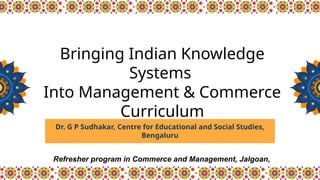
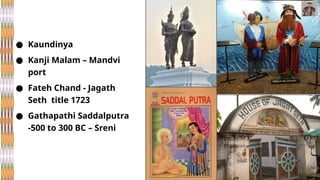
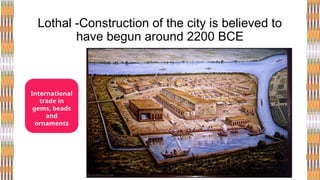
![Routes in early Hindu Period. --The early rock-cut remains at
Ajanta. at Patna near Chalisgaon. at Chandor, and at Nasik,
make it probable that, as far back as the second and first
centuries before Christ, trade routes between north and
south India passed close to those places. In the third
century A. D., the author of the Periplus (247 A. D.)
mentions that trade crossed Khandesh from Broach to
Paithan on the Godavari and to Tagara ten days further east
[Mc Crindle's Periplus, 125-26.]. If the statement that it lay
ten days to the east of Paithan is correct, the trade probably
passed eastwards through Khandesh, leaving the district
either near Patan or near Ajanta. The road, though very
difficult, was passable for wagons [Gazetteer of the Bombay
Presidency, Vol. XII, 1880.].](https://image.slidesharecdn.com/bringingiksintomanagementandcommercecurriculum-pune-online-240823051009-9d1684b0/85/Bringing-IKS-into-Management-and-Commerce-curriculum-4-320.jpg)
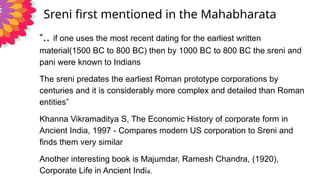

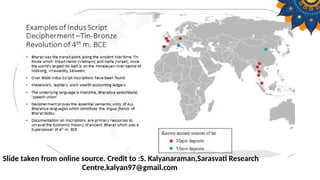
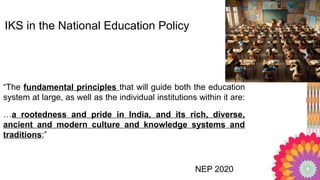
![âInstilling knowledge of India and its varied social, cultural,
and technological needs, its inimitable artistic, language, and
knowledge traditions, and its strong ethics in Indiaâs young
people is considered critical for purposes of national pride,
self-confidence, self-knowledge, cooperation, and
integrationâ
[NEP 2020, Introduction, p.
4]](https://image.slidesharecdn.com/bringingiksintomanagementandcommercecurriculum-pune-online-240823051009-9d1684b0/85/Bringing-IKS-into-Management-and-Commerce-curriculum-9-320.jpg)
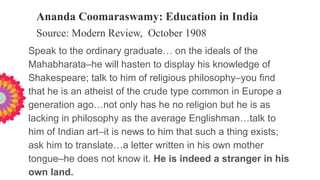
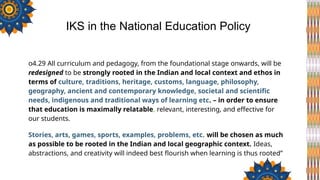
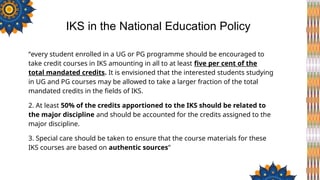
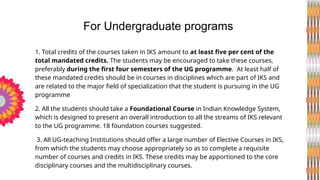
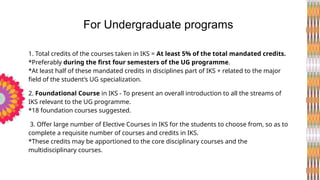
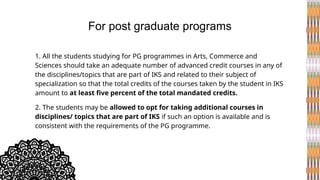
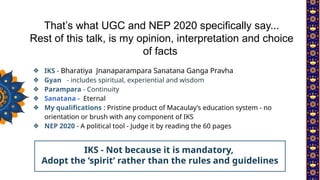
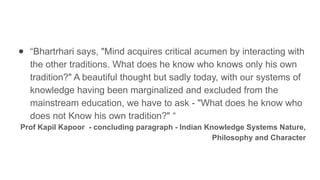
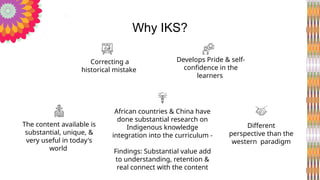
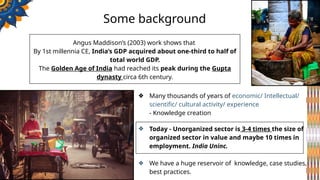
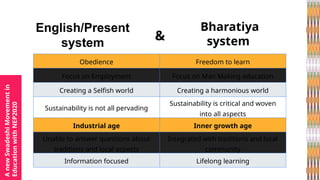
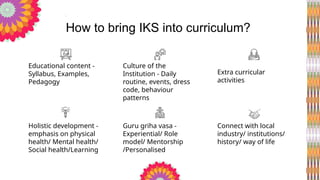
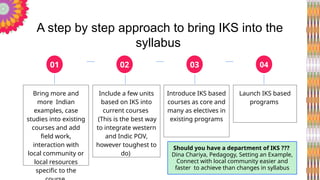
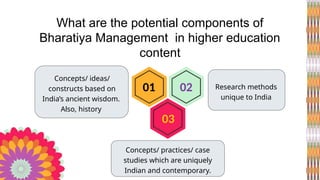
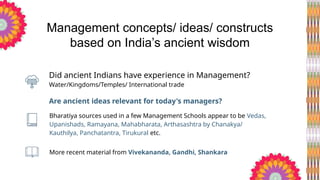
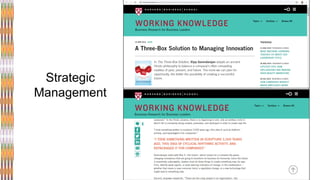
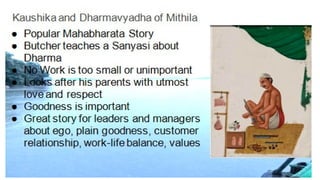
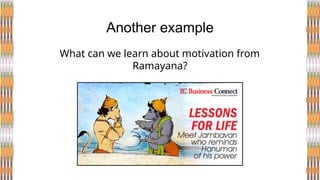
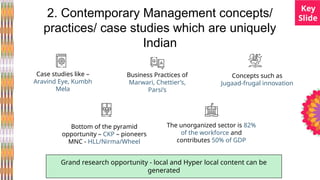
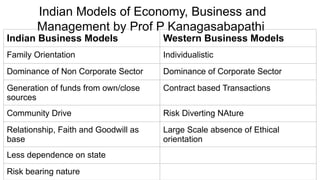
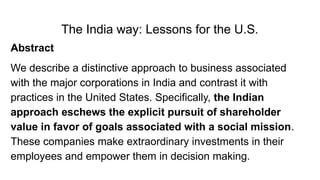
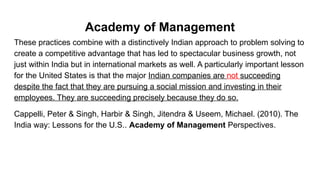
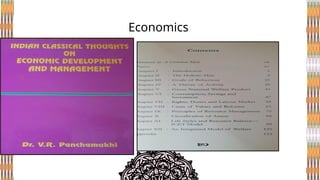
![â Differences in concept of time (linear/ cyclical) â Start with Goal/ Self
â Western research is aimed at proving with scientific data analysis
â nyAya includes information perceived by sense organs, and is empirical.
Indian methodology uses both empirical evidence and experience (for
direct experience of truth or self or brahman).
â Indian research is aimed at proving and ârealizingâ the truth by oneself for
oneself
Direct experience alone is the basis for all proofs.... [2.19-20] Yoga-
VÂŊasis.t.ha
3. Research methodology that is uniquely
Indian](https://image.slidesharecdn.com/bringingiksintomanagementandcommercecurriculum-pune-online-240823051009-9d1684b0/85/Bringing-IKS-into-Management-and-Commerce-curriculum-33-320.jpg)
